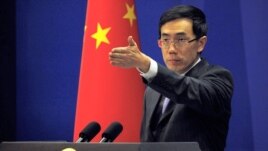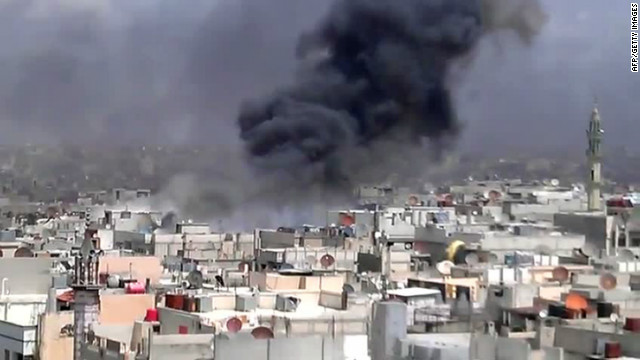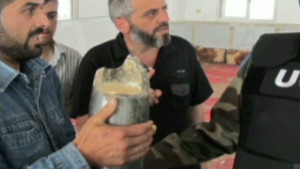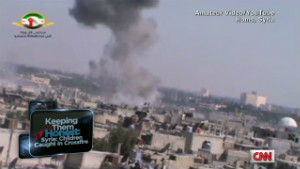THE world could slip back into a Cold War over Syria and the sprawling Arab country could break up into two or three warring parts, with unforeseeable consequences for the Middle East, a senior Israeli military commander said.
"Support for (Syrian President Bashar) Assad from Russia and China is taking us back to the Cold War," he said this week, on condition of anonymity. "The world is not a one-man show."
A regional proxy war is already under way in Syria, he said, with direct, daily, on-the-ground support for Assad from his allies in Iran and Lebanon's heavily-armed Hezbollah movement.
"There can be real chaos. It can take years," he said.
The 15-month-old conflict in Syria has grown into a full-scale civil war, the U.N. peacekeeping chief said on Tuesday.
Hundreds of civilians, rebels and members of Assad's armyand security forces have been killed since a ceasefire deal brokered two months ago was meant to halt the bloodshed.
Russia and China backed the United Nations plan to send in military observers to check on adherence to the truce, but have refused to consider Western calls for a U.N. Security mandate that would authorise force, including military intervention.
The West has repeatedly said it has no plan to intervene, but has not ruled it out.
"In Syria, a proxy war is under way with Iran supplying arms to its Alawite client and Turkey actively arming the opposition," says Can Kasapoglu, a Turkish analyst who is currently a visiting fellow at Israel's Begin-Sadat think tank.
The rebel Free Syrian Army is getting support from Sunni states Turkey, Saudi Arabia and Qatar, all allies of Washington.
Recent video of spectacularly successful attacks destroying Syrian tanks suggests the rebels may have obtained modern anti-tank weapons more powerful than rocket-propelled grenades.
Washington says Russia may be sending attack helicopters to its ally Syria. Claims by Moscow that its arms transfers toSyria are unrelated to the conflict are "patently untrue," U.S. Secretary of State Hillary Clinton said on Tuesday.
Russia's foreign minister on Wednesday defended his country's sale of arms to Syria and accused the United States of supplying rebels with weapons to fight against the government.
"We are not violating any international law in performing these contracts," said Sergei Lavrov at a news conference in Tehran shown on Iranian state television.
"They (the United States) are providing arms and weapons to the Syrian opposition that can be used in fighting against theDamascus government," he said, speaking through an interpreter.
The exchange was reminiscent of Cold War rhetoric when proxy wars were frequent. The superpowers, who could not risk a direct nuclear-armed confrontation between each other, battled for hegemony by involvement on warring sides in third countries.
From 1945 to the collapse of Soviet communism in 1989 there were proxy wars in Greece, Korea, Vietnam, Lebanon Afghanistan ,Angola, Mozambique, Cuba, El Salvador and Nicaragua.
In the post-Cold War world, America was the only superpower but spheres of influence were heeded.
Moscow did not take on NATO when its former Yugoslav allySerbia was bombed by the Western alliance in 1999 over the civil war in Kosovo.
In the former Soviet republic of Georgia, Russia was able to successfully back its secessionist allies militarily without triggering a war with the United States.
In Libya last year, however, Moscow was stung by NATO's military intervention under a U.N. mandate it believed had been stretched beyond the limits it had agreed to.
Israel sees the Syrian civil war becoming part of the struggle for dominance in the Arab world between Sunni and Shi'ite Muslims. "Shia are only 20 percent of Muslims in the world but have taken the lead away from the Sunnis," he said.
"Assad has seen the death of Gaddafi in Libya and the fate of Mubarak in Egypt and he understands he has no choice. He knows his Alawite minority will be slaughtered," the officer said. "We all know the end of the story. We just don't know the chapters."
The question is who might grab the lead in "this Sykes-Picot country", he said, referring to Syria's creation by colonial powers Britain and France after the First World War, on what look like arbitrary geographical lines that disregard tribal and ethnic distinctions.
"Who will replace Assad? Will it be all those doctors inEurope (Syrian National Council in exile) or will it be al Qaeda?" said the officer, adding U.S. ally Saudi Arabia was very concerned.
"It is not a nation state like Iran and Egypt are. It can become two or three states."
The risks of a regional war were clear, he said, as key U.S.Middle East ally Israel faces the possibility of its sworn enemy Iran becoming a nuclear-armed state and contemplates whether military action will be needed in the end to stop it.
Israel has to be prepared, he said.
"You don't know what will trigger it, but everything is ready for a big, big fire. You don't know who will strike the match."
LONDON (Reuters) - With the United States accusing Russia of providing attack helicopters and ethnic violence spiraling out of control, Syria's conflict is pulling world and regional powers into a mounting proxy confrontation.
While Washington, Moscow and Beijing as well as European and Middle Eastern capitals have all endorsed Kofi Annan's peace plan, analysts say it has become increasingly obvious that they have also been taking sides.
Kofi Annan Publicly critical of violence by all parties but broadly lining up behind embattled Syrian leader Bashar al-Assad are not only Iran but also long-term ally Russia. At stake for Moscow could be its Tartus naval base and lucrative trade, including arms sales. While there are few signs of any direct involvement, China looks to be throwing its diplomatic weight behind Moscow, both keen to avoid a repeat of events in Libya.
Washington maintains it is not providing direct military support to the opposition Free Syrian Army, but has pledged "non-lethal" support. Some believe it may be helping facilitate arms deliveries from Qatar, Saudi Arabia and perhaps others.
There are also growing signs al Qaeda-linked militants may be entering the fray against Assad, worrying Western states.
In some ways, the face-off already has more than a flavor of Cold War era confrontations, in which Western and communist states fought, manipulated and almost certainly prolonged a host of conflicts in the developing world.
With communal militia increasingly blamed for bloody massacres within Syria itself, it may also feed a Middle East-wide growing ethnic confrontation between Saudi-backed Sunni and sometimes Iranian-backed Shi'ite forces.
"If you look at what's happening on the ground, both sides are now acting like a ceasefire doesn't even exist," says David Hartwell, Middle East analyst at IHS Jane's. "The great powers say they want peace in Syria and they are right in saying that conflict there is dangerous... but if you look at what they've been doing, they have simply been making matters worse."
Without outside encouragement, some doubt Syria's fractious and chaotic opposition would have kept up the initially peaceful struggle against Assad's forces for so long. Moscow has simply shrugged at U.S. talk of helicopter shipments, and maintains its arms deliveries are legitimate and have no bearing on a domestic conflict.
Ultimately, it seems clear both sides believe that if they can continue the fight and convince their foreign backers that they have a credible chance of victory - or at least survival - then they will continue to receive outside support.
FUNDAMENTAL POLITICAL DISAGREEMENT
Moscow's backing for Assad might in part be driven by local strategic interests, analysts say, particularly a desire to preserve its main regional ally and weapons buyer as well as retain a naval base in the eastern Mediterranean.
But most believe President Vladimir Putin and others believe much more is at stake. For Russia, and to a slightly lesser extent China, Syria is seen as a battleground in which they can draw a line in the sand and end years of unilateral Western foreign intervention.
"It's not about contracts or our base," said Alexander Golts, an independent Moscow-based analyst. "Russian support to Syria is mostly based on ideology."
In Kosovo, Iraq and most recently Libya, Moscow in particular has been forced to simply sit on the sidelines and watch the United States and allies act almost unchallenged against its one-time allies.
Facing their own internal rise in protest and accusing the West of backing pro-democracy groups within their borders, Russia and China would also like to re-establish another once almost universally agreed principle: that states have the right to crush dissent and restore order in their territory with whatever force necessary and without external meddling.
That stands in stark contrast to western talk of a right - or even obligation - to protect civilians even from their own governments, invoked last year in Libya although only applied sporadically to the other countries of the "Arab Spring".
"Russia does not agree with the breakdown of the system of international law which is currently happening," said Yevgeny Minchenko, director of the Moscow-based International Institute of Political Analysis. "Why should Russia allow the Syrian regime to be annihilated by countries that it has a competitive relationship with like Saudi Arabia, Qatar, and the West?"
Russian weapons shipments would almost certainly continue, he said, although if a Western-backed military intervention were launched against Assad it was unlikely Moscow would fight and risk all out global war.
OUTRIGHT INTERVENTION UNLIKELY
With the United States already well into a presidential election campaign and Europe preoccupied with dangers of euro zone collapse however, any repeat of Western and the Gulf action in Libya is seen highly unlikely.
Not only is Syria's military considerably more capable than that of Muammar Gaddafi and the country considerably more complex to fighting, but most observers believe the West is now in a considerably weaker position than even a year ago.
The deployment of a Russian aircraft carrier earlier this year to Syria after the United States quietly moved one of its own carriers to the region sent a clear message, analysts say.
"It is about pushing back the power of the United States, which has been struggling in the region since the "Arab Spring"," said IHS Jane's Hartwell, pointing to the revolutions against U.S.-backed strongmen such as Egypt's Hosni Mubarak that left Washington wondering how to react.
Some believe a similar agenda may be behind at least some tacit Chinese and Russian support to U.S. enemy Iran, with Beijing in particular seen undermining Western sanctions with continuing oil purchases.
But others argue the most dangerous trend is taking place within the region itself; the growing sense of ethnic polarization and conflict between Sunni and Shi'ite in the year and a half since the "Arab Spring" began,
Saudi and wider Gulf Cooperation Council (GCC) fears Iran might be stirring unrest among Shi' ites in eastern Saudi, Bahrain and northern Yemen may help drive their support for the broadly Sunni Syrian opposition, some suggest.
Through its confrontation with Tehran over nuclear issues and long-term Saudi alliance, some in the United States worry Washington itself may be being drawn awkwardly towards a sectarian regional Sunni agenda.
"This is also the inspiration for the GCC to be so outspoken against Assad in Syria, not the goodness of their humanitarian hearts but the fact he is backed by Iran," said Hayat Alvi, professor of Middle Eastern studies at the US Naval War College in Rhode Island.
When should states intervene militarily to stop atrocities in other countries? The question is an old and well-traveled one. Indeed, it is now visiting Syria.
In 1904, U.S. President Theodore Roosevelt, referring to Cuba, argued that the United States should intervene by force of arms when "there are occasional crimes committed on so vast a scale and of such peculiar horror." A century earlier, in 1821, as Europeans and Americans debated whether to intervene in Greece's struggle for independence, U.S. President John Quincy Adams warned his fellow Americans about "going abroad in search of monsters to destroy."
More recently, after a genocide that cost nearly 800,000 lives in Rwanda in 1994 and the slaughter of Bosnian men and boys at Srebrenica in 1995, many people vowed that such atrocities should never again be allowed to occur. When Serbian leader Slobodan Milosevic engaged in large-scale ethnic cleansing in Kosovo in 1999, the United Nations Security Council adopted a resolution recognizing the humanitarian catastrophe but could not agree on a second resolution to intervene, given the threat of a Russian veto. Instead, NATO countries bombed Serbia in an effort that many observers regarded as legitimate but not legal.
In the aftermath, then-UN Secretary-General Kofi Annan created an international commission to recommend ways that humanitarian intervention could be reconciled with Article 2.7 of the UN Charter, which upholds member states' domestic jurisdiction. The commission concluded that states have a responsibility to protect their citizens. If a nation disregards that responsibility by attacking its own citizens, the international community can consider armed intervention.
The Responsibility to Protect principle was adopted unanimously at the UN's World Summit in 2005, but subsequent events showed that not all member states interpreted the resolution the same way. Russia has consistently argued that only Security Council resolutions, not General Assembly resolutions, are binding international law. Meanwhile, Russia has vetoed a Security Council resolution on Syria. Somewhat ironically, Annan has been called back and enlisted in a so-far futile effort to stop the carnage there.
Until last year, many observers regarded the Responsibility to Protect principle as, at best, a pious hope or a noble failure. But in 2011, as Libyan leader Moammar Gadhafi prepared to exterminate his opponents in Benghazi, the Security Council invoked the Responsibility to Protect principle as the basis for a resolution authorizing NATO to use armed force in Libya. U.S. President Barack Obama was careful to wait for resolutions by the Arab League and the Security Council, thereby avoiding the costs to U.S. soft power that former U.S. President George W. Bush suffered when the country intervened in Iraq in 2003. But Russia, China and other countries felt that NATO exploited the resolution to engineer regime change rather than merely protecting citizens in Libya, as the resolution wording stipulated.
In fact, the Responsibility to Protect is more about struggles over political legitimacy and soft power than it is about hard international law. Some Western lawyers argue that it entails the responsibility to combat genocide, crimes against humanity and war crimes under various conventions of international humanitarian law. But Russia, China and others have become reluctant to provide a legal or political basis for actions such as what occurred in Libya.
There are other reasons why Responsibility to Protect has not been a success in the Syrian case. Drawn from traditional "just war" theory, Responsibility to Protect rests not only on right intentions, but also on the existence of a reasonable prospect of success. Many observers highlight the important physical and military differences between Libya and Syria that would make Syrian no-fly zones or no-drive zones problematic. Some Syrians who oppose President Bashar Assad's regime, pointing to Baghdad in 2005, argue that the one thing worse than a cruel dictator is a sectarian civil war.
Such factors are symptomatic of larger problems with humanitarian interventions. For starters, motives are often mixed. Moreover, we live in a world of diverse cultures, and we know very little about social engineering and how to build nations. When we cannot be sure how to improve the world, prudence becomes an important virtue, and hubristic visions can pose a grave danger. Foreign policy, like medicine, must be guided by the basic principle "Do no harm."
Prudence does not necessarily mean that nothing can be done in Syria. Other governments can continue to try to convince Russia that its interests are better served by getting rid of the current regime than by permitting the continued radicalization of his opponents. Tougher sanctions can continue to delegitimize the regime, and Turkey might be persuaded to take stronger steps against its neighbor.
Moreover, prudence does not mean that humanitarian interventions will always fail. In some cases, even if motives are mixed, the prospects of success are reasonable, and the misery of a population can be relieved at modest expense. For example, military interventions in Sierra Leone, Liberia, East Timor and Bosnia did not solve all problems, but they did improve the lives of the people there. Other interventions — for example, in Somalia — did not.
Recent large-scale interventions in Iraq and Afghanistan, though not primarily humanitarian, have eroded public support for military action. But we should recall U.S. writer Mark Twain's story about his cat. After sitting on a hot stove, it would never sit on a hot stove again, but neither would it sit on a cold one.
Although interventions will continue to occur, they are now more likely to be shorter, involve smaller-scale forces and rely on technologies that permit action at a greater distance. In an age of cyber warfare and drones, the end of Responsibility to Protect or humanitarian intervention is hardly foretold.





 Reply With Quote
Reply With Quote

 China's Foreign Ministry spokesman Liu Weimin gestures to a journalist during a news conference in Beijing (file photo).
China's Foreign Ministry spokesman Liu Weimin gestures to a journalist during a news conference in Beijing (file photo). 



 AFP PHOTO/Handout
AFP PHOTO/Handout
 REUTERS/Shaam News Network
REUTERS/Shaam News Network REUTERS/Shaam News Network/Handout
REUTERS/Shaam News Network/Handout 

Bookmarks